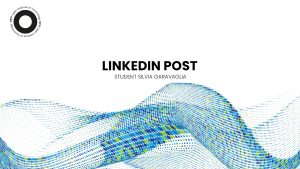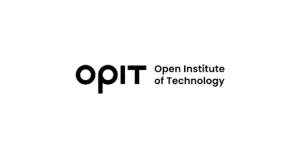Read the full article below (in Italian):
Data Science & AI
Dive deep into data-driven technologies: Machine Learning, Reinforcement Learning, Data Mining, Big Data, NLP & more. Stay updated.
Search inside The Magazine

The Open Institute of Technology (OPIT) is a dynamic new university that provides practical learning opportunities for people looking to thrive in a dynamic, tech-driven workplace. It offers bachelor’s courses for those at the start of their journey and master’s courses for professionals hoping to expand their horizons. This includes students like Silvia Garavaglia.
We recently spoke to Silvia about her experience studying with OPIT. She shared how her professional interests led her to OPIT and how her studies have led her to a new and unanticipated career path in artificial intelligence (AI).
Understanding the Data
Until recently, Silvia Garavaglia worked as a project manager, leading complex assignments across a variety of European firms. Silvia shared that she was increasingly working on data-driven initiatives and learned the value that big data, combined with AI, could deliver in business. However, she felt that she was just scratching the surface of what AI-enhanced data analysis could do and that her lack of experience on the technical side was holding her back from doing more with it.
In short, Silvia found herself wanting to move from just managing and leveraging data to truly understanding how the technology works under the hood. She knew that she would have to find educational resources to support this journey.
Finding a Learning Partner
Silvia’s professional goals motivated her to start looking for a learning partner. But this was a challenge for a number of reasons. First, she needed a flexible program compatible with her busy work life. Many of the courses she found weren’t flexible enough in their availability to fit into her schedule. Second, many relevant programs demand a strong technical background for master-level courses.
From her on-the-job experience, Silvia knew that she wanted a course that combined technical skills development with teaching strategic approaches that focus on application. She knew that the things she wanted to achieve would require a combination of the two.
OPIT’s MSc in Applied Data Science & AI
After much research, Silvia chose OPIT’s MSc in Applied Data Science & AI, which is designed to prepare students to occupy the intersection between management and tech. A master’s course designed for professionals with varied backgrounds, the program combines technical courses on data science, machine learning, and artificial intelligence with courses on business management and problem-solving.
What students learn in their dynamic online classroom is then applied to real-life business challenges that can be addressed using data science and AI. These solutions are taught by a faculty who are not just teachers, but active professionals working at the cutting edge of their fields.
The course also includes an internship or a capstone project that sees students apply their learning to new challenges, turning theory into experience.
Silvia said that she chose OPIT due to its practical content and human-centered approach. This set it apart from other academic programs because it was a course “built by people who build.”
She knew she had made the right decision when she started the onboarding process, which she described as responsive, transparent, and unexpectedly personal.
Learning That Changed Everything
While Silvia has always considered herself an eternal student, interested in always learning and growing, she said that the course changed her perspective. While she may have started out simply looking for knowledge to help her do her job better, what she learned made her completely rethink her role. She began to see new possibilities for her career, creating opportunities rather than fitting into cookie-cutter roles.
Silvia explained that she went from seeing herself as someone who supports tech teams to someone who creates technological solutions that solve real-world problems. She was no longer playing catch-up with her tech team; she was ready to create while following her own path forward.
A New Path
Silvia is currently interning at Midnight Ventures, an engineering company that develops cutting-edge AI agents that solve real business problems with intelligent automation and multi-agent systems.
She is working on a medical AI diagnostics platform for aesthetic medicine that analyzes ultrasounds in real time, identifying dermal fillers and skin conditions with medical precision, enhancing diagnostic capabilities. Silvia said this project appealed because of its focus on leveraging technology to solve human problems, supporting doctors to better serve their patients.
Among other things, Midnight Ventures is also working on a platform to democratize access to algorithmic trading by converting natural language trading strategies into executable code.
All of OPIT’s master’s courses include a final capstone project that lets students apply their learning to real-world challenges that inspire them. For her Capstone project, Silvia is working with HYPE, a financial services firm in Milan, on an AI-powered onboarding agent that combines technology with crafting the best possible human experience.
An Exciting Future
Overall, Silvia says that she is excited for the future. She is on the path to becoming an AI developer, learning to code step by step, while leading real projects that leverage AI to solve human challenges.
Others looking to do the same might also consider OPIT as a gateway to a new path forward. OPIT’s MSc in Applied Data Science and AI is a great place to start.
OPIT Master’s Courses
OPIT also offers an MSc in Digital Business and Innovation for professionals who want to drive innovation and lead digital entrepreneurship with a focus on growth hacking, digital transformation, and leveraging AI to drive innovation.
The MSc in Responsible AI also combines technical expertise with real-world applications, with a focus on the ethical implications of modern AI and the architecture of sustainable AI systems.
OPIT’s MSc in Enterprise Cybersecurity is focused on digital security solutions, but also focuses on combining the technical and managerial sides to bridge the gap between coding and application.
Contact Career Services to see how OPIT can support you on your journey toward your professional goals.




Source:
- Il Sole 24 Ore, published on June 23rd, 2025
At its core is a teaching heritage made up of 131 courses, 3,500 hours of video, 1,800 live sessions

Source:
- Agenda Digitale, published on June 16th, 2025
By Lokesh Vij, Professor of Cloud Computing Infrastructure, Cloud Development, Cloud Computing Automation and Ops and Cloud Data Stacks at OPIT – Open Institute of Technology
NIST identifies five key characteristics of cloud computing: on-demand self-service, network access, resource pooling, elasticity, and metered service. These pillars explain the success of the global cloud market of 912 billion in 2025

You’ve probably seen two of the most recent popular social media trends. The first is creating and posting your personalized action figure version of yourself, complete with personalized accessories, from a yoga mat to your favorite musical instrument. There is also the Studio Ghibli trend, which creates an image of you in the style of a character from one of the animation studio’s popular films.
Both of these are possible thanks to OpenAI’s GPT-4o-powered image generator. But what are you risking when you upload a picture to generate this kind of content? More than you might imagine, according to Tom Vazdar, chair of cybersecurity at the Open Institute of Technology (OPIT), in a recent interview with Wired. Let’s take a closer look at the risks and how this issue ties into the issue of responsible artificial intelligence.
Uploading Your Image
To get a personalized image of yourself back from ChatGPT, you need to upload an actual photo, or potentially multiple images, and tell ChatGPT what you want. But in addition to using your image to generate content for you, OpenAI could also be using your willingly submitted image to help train its AI model. Vazdar, who is also CEO and AI & Cybersecurity Strategist at Riskoria and a board member for the Croatian AI Association, says that this kind of content is “a gold mine for training generative models,” but you have limited power over how that image is integrated into their training strategy.
Plus, you are uploading much more than just an image of yourself. Vazdar reminds us that we are handing over “an entire bundle of metadata.” This includes the EXIF data attached to the image, such as exactly when and where the photo was taken. And your photo may have more content in it than you imagine, with the background – including people, landmarks, and objects – also able to be tied to that time and place.
In addition to this, OpenAI also collects data about the device that you are using to engage with the platform, and, according to Vazdar, “There’s also behavioral data, such as what you typed, what kind of image you asked for, how you interacted with the interface and the frequency of those actions.”
After all that, OpenAI knows a lot about you, and soon, so could their AI model, because it is studying you.
How OpenAI Uses Your Data
OpenAI claims that they did not orchestrate these social media trends simply to get training data for their AI, and that’s almost certainly true. But they also aren’t denying that access to that freely uploaded data is a bonus. As Vazdar points out, “This trend, whether by design or a convenient opportunity, is providing the company with massive volumes of fresh, high-quality facial data from diverse age groups, ethnicities, and geographies.”
OpenAI isn’t the only company using your data to train its AI. Meta recently updated its privacy policy to allow the company to use your personal information on Meta-related services, such as Facebook, Instagram, and WhatsApp, to train its AI. While it is possible to opt-out, Meta isn’t advertising that fact or making it easy, which means that most users are sharing their data by default.
You can also control what happens with your data when using ChatGPT. Again, while not well publicized, you can use ChatGPT’s self-service tools to access, export, and delete your personal information, and opt out of having your content used to improve OpenAI’s model. Nevertheless, even if you choose these options, it is still worth it to strip data like location and time from images before uploading them and to consider the privacy of any images, including people and objects in the background, before sharing.
Are Data Protection Laws Keeping Up?
OpenAI and Meta need to provide these kinds of opt-outs due to data protection laws, such as GDPR in the EU and the UK. GDPR gives you the right to access or delete your data, and the use of biometric data requires your explicit consent. However, your photo only becomes biometric data when it is processed using a specific technical measure that allows for the unique identification of an individual.
But just because ChatGPT is not using this technology, doesn’t mean that ChatGPT can’t learn a lot about you from your images.
AI and Ethics Concerns
But you might wonder, “Isn’t it a good thing that AI is being trained using a diverse range of photos?” After all, there have been widespread reports in the past of AI struggling to recognize black faces because they have been trained mostly on white faces. Similarly, there have been reports of bias within AI due to the information it receives. Doesn’t sharing from a wide range of users help combat that? Yes, but there is so much more that could be done with that data without your knowledge or consent.
One of the biggest risks is that the data can be manipulated for marketing purposes, not just to get you to buy products, but also potentially to manipulate behavior. Take, for instance, the Cambridge Analytica scandal, which saw AI used to manipulate voters and the proliferation of deepfakes sharing false news.
Vazdar believes that AI should be used to promote human freedom and autonomy, not threaten it. It should be something that benefits humanity in the broadest possible sense, and not just those with the power to develop and profit from AI.
Responsible Artificial Intelligence
OPIT’s Master’s in Responsible AI combines technical expertise with a focus on the ethical implications of AI, diving into questions such as this one. Focusing on real-world applications, the course considers sustainable AI, environmental impact, ethical considerations, and social responsibility.
Completed over three or four 13-week terms, it starts with a foundation in technical artificial intelligence and then moves on to advanced AI applications. Students finish with a Capstone project, which sees them apply what they have learned to real-world problems.

During the Open Institute of Technology’s (OPIT’s) 2025 Graduation Day, we conducted interviews with many recent graduates to understand why they chose OPIT, how they felt about the course, and what advice they might give to others considering studying at OPIT.
Karina is an experienced FinTech professional who is an experienced integration manager, ERP specialist, and business analyst. She was interested in learning AI applications to expand her career possibilities, and she chose OPIT’s MSc in Applied Data Science & AI.
In the interview, Karina discussed why she chose OPIT over other courses of study, the main challenges she faced when completing the course while working full-time, and the kind of support she received from OPIT and other students.
Why Study at OPIT?
Karina explained that she was interested in enhancing her AI skills to take advantage of a major emerging technology in the FinTech field. She said that she was looking for a course that was affordable and that she could manage alongside her current demanding job. Karina noted that she did not have the luxury to take time off to become a full-time student.
She was principally looking at courses in the United States and the United Kingdom. She found that comprehensive courses were expensive, costing upwards of $50,000, and did not always offer flexible study options. Meanwhile, flexible courses that she could complete while working offered excellent individual modules, but didn’t always add up to a coherent whole. This was something that set OPIT apart.
Karina admits that she was initially skeptical when she encountered OPIT because, at the time, it was still very new. OPIT only started offering courses in September 2023, so 2025 was the first cohort of graduates.
Nevertheless, Karina was interested in OPIT’s affordable study options and the flexibility of fully remote learning and part-time options. She said that when she looked into the course, she realized that it aligned very closely with what she was looking for.
In particular, Karina noted that she was always wary of further study because of the level of mathematics required in most computer science courses. She appreciated that OPIT’s course focused on understanding the underlying core principles and the potential applications, rather than the fine programming and mathematical details. This made the course more applicable to her professional life.
OPIT’s MSc in Applied Data Science & AI
The course Karina took was OPIT’s MSc in Applied Data Science & AI. It is a three- to four-term course (13 weeks), which can take between one and two years to complete, depending on the pace you choose and whether you choose the 90 or 120 ECTS option. As well as part-time, there are also regular and fast-track options.
The course is fully online and completed in English, with an accessible tuition fee of €2,250 per term, which is €6,750 for the 90 ECTS course and €9,000 for the 120 ECTS course. Payment plans are available as are scholarships, and discounts are available if you pay the full amount upfront.
It matches foundational tech modules with business application modules to build a strong foundation. It then ends with a term-long research project culminating in a thesis. Internships with industry partners are encouraged and facilitated by OPIT, or professionals can work on projects within their own companies.
Entry requirements include a bachelor’s degree or equivalency in any field, including non-tech fields, and English proficiency to a B2 level.
Faculty members include Pierluigi Casale, a former Data Science and AI Innovation Officer for the European Parliament and Principal Data Scientist at TomTom; Paco Awissi, former VP at PSL Group and an instructor at McGill University; and Marzi Bakhshandeh, a Senior Product Manager at ING.
Challenges and Support
Karina shared that her biggest challenge while studying at OPIT was time management and juggling the heavy learning schedule with her hectic job. She admitted that when balancing the two, there were times when her social life suffered, but it was doable. The key to her success was organization, time management, and the support of the rest of the cohort.
According to Karina, the cohort WhatsApp group was often a lifeline that helped keep her focused and optimistic during challenging times. Sharing challenges with others in the same boat and seeing the example of her peers often helped.
The OPIT Cohort
OPIT has a wide and varied cohort with over 300 students studying remotely from 78 countries around the world. Around 80% of OPIT’s students are already working professionals who are currently employed at top companies in a variety of industries. This includes global tech firms such as Accenture, Cisco, and Broadcom, FinTech companies like UBS, PwC, Deloitte, and the First Bank of Nigeria, and innovative startups and enterprises like Dynatrace, Leonardo, and the Pharo Foundation.
Study Methods
This cohort meets in OPIT’s online classrooms, powered by the Canvas Learning Management System (LMS). One of the world’s leading teaching and learning software, it acts as a virtual hub for all of OPIT’s academic activities, including live lectures and discussion boards. OPIT also uses the same portal to conduct continuous assessments and prepare students before final exams.
If you want to collaborate with other students, there is a collaboration tab where you can set up workrooms, and also an official Slack platform. Students tend to use WhatsApp for other informal communications.
If students need additional support, they can book an appointment with the course coordinator through Canvas to get advice on managing their workload and balancing their commitments. Students also get access to experienced career advisor Mike McCulloch, who can provide expert guidance.
A Supportive Environment
These services and resources create a supportive environment for OPIT students, which Karina says helped her throughout her course of study. Karina suggests organization and leaning into help from the community are the best ways to succeed when studying with OPIT.
Have questions?
Visit our FAQ page or get in touch with us!
Write us at +39 335 576 0263
Get in touch at hello@opit.com
Talk to one of our Study Advisors
We are international
We can speak in:
